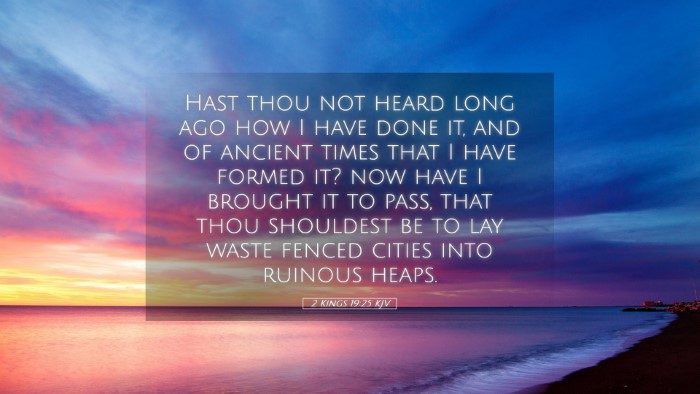Commentary on 2 Kings 19:25
Verse: 2 Kings 19:25
“But have you not heard that I determined it long ago? I planned from days of old what I now bring to pass, that you should turn fortified cities into heaps of ruins.”
Introduction
This verse from 2 Kings 19:25 captures a pivotal moment in the narrative of the Assyrian siege against Jerusalem. Herein, God underscores His sovereign control over historical events, demonstrating that He has long foreordained the downfall of powerful nations.
Sovereignty of God
Matthew Henry emphasizes the sovereignty of God in this verse. He notes that God is not only aware of the actions of Assyria but has preordained them. This challenges the notion of human autonomy in the face of divine providence. Henry argues that God’s plans are ultimately fulfilled regardless of human attempts to thwart them.
Historical Context
Albert Barnes provides a detailed historical context for this passage. The verse arises during a time of great turmoil for Judah, facing the formidable threat of the Assyrian empire under King Sennacherib. Barnes notes that Sennacherib had laid siege to Jerusalem, mocking Yahweh and claiming invincibility. In this context, God reminds the king of Assyria that he is merely an instrument of divine will and that his efforts will ultimately lead to ruin.
Prophetic Assurance
Adam Clarke points out the prophetic nature of God’s declaration to Sennacherib. It serves as an assurance of His protection over Jerusalem and His people. Clarke indicates that the phrase “I planned from days of old” illustrates that God’s decrees are eternal and that His omniscience allows Him to dictate the course of history. This assurance is particularly poignant for the beleaguered people of Judah, providing them hope amidst despair.
Theological Implications
- Divine Predestination: The concept that God has predetermined the events of history serves as a foundation for many theological discussions. It prompts inquiries into human free will vis-à-vis divine sovereignty, a topic explored by various scholars throughout history.
- Evidence of God's Power: The declaration that cities would turn to ruins serves as a demonstration of God's unrivaled power over nations and rulers. This highlights a core tenet of biblical theology: God is the ultimate victor over evil.
- God’s Control in Chaos: In chaotic circumstances, this passage reaffirms that God is in control. His plans will manifest, offering solace in turbulent times to individuals and communities facing challenges.
Application for Today
For pastors and theologians, this verse invites reflection on how God's sovereignty plays out in contemporary moral and ethical issues. It draws believers to consider their responses to fear and despair in today's world, encouraging faith in God’s overarching plans. The experiences of the ancient Israelites can inform our understanding of current global tensions and personal crises.
Conclusion
In summary, 2 Kings 19:25 reveals profound insights regarding God's sovereignty, prophetic assurance, and the ultimate futility of human pride against divine determination. The commentaries of Matthew Henry, Albert Barnes, and Adam Clarke collectively reinforce the significance of this scripture, urging scholars and students to embrace the richness of God’s word in understanding our world and faith.


